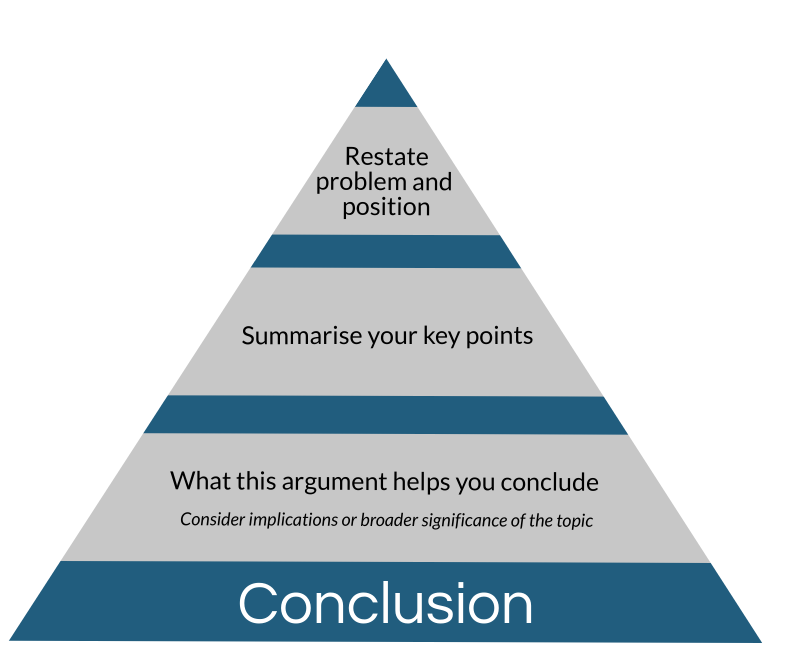The conclusions are an integral and important part of a thesis. In fact, like the introduction, the concluding part must also contain the meaning of the entire work. To set them correctly, there are some small tricks that I will illustrate today. In this article, we read about How to write a conclusion?
-
“Experimental” thesis:
First of all, we need to consider the type of thesis. If it is an “experimental” thesis that has provided for empirical research, a synthetic picture of the results obtained must be reported in the conclusions. It will not be necessary to repeat them all, because they should have already been extensively discussed previously.
However, it will be appropriate to select the most important ones and discuss them, highlighting for example the links between them. Furthermore, it is also necessary to provide an overall interpretation of the results that emerged (we can help ourselves by relating the partial conclusions reached at the end of each chapter), as well as brief comparisons with other similar studies or their citations.
-
Descriptive thesis
During this phase, it must be borne in mind that the reader has “put up with” pages and pages of hypotheses, discussions, and presentation of the results …. and may have lost sight of the goal you declared to set at the beginning. Therefore, it is good to refresh his memory in a clear and concise way.
In the case of a descriptive thesis “compilation”, in which theoretical concepts must therefore be exposed, it will instead be important to insert at the end a schematic summary of the paper that encompasses the entire work and that highlights the salient points and any problems that emerged through its development. Although it will be necessary to summarize the most significant passages of the study conducted, it will also be appropriate to accompany them by a personal critical interpretation and to illustrate in the concluding section one’s own considerations on the analyzes and research carried out.
Hypotheses of Investigation
However, whatever the nature of the thesis, it will be fundamental to always illustrate in the conclusions the possible and/or desirable developments of the research itself: this means that the conclusions must contain new hypotheses of investigation, unresolved problems towards which to concentrate the studies or some ideas to analyze further connected elements. You will say: “How can I find them?”
The secret consists in asking this question: “ If I had to write other pages of the thesis, which topics would I deepen further?”. These reflections can be presented in the form of a “bulleted list”, with a brief explanation for each point, or you can indicate and argue them within a larger discourse to write a conclusion. Obviously, the choice of form will depend on the topic of the thesis. In this regard, I advise you to mention (briefly but concisely) also the possibilities of use and practical application in a specific sector or context.
What to Avoid!
In the conclusions of a thesis, it is considered inappropriate to repeat the titles of the chapters or the list of topics it deals with because they have already been mentioned in the introductory part. Even if the conclusions must relate to the introduction, they must not constitute a repetition of what has already been discussed above. Remember that the reader… ..has already read the content!
Therefore, repeating titles, concepts and definitions already treated would only give the idea of wanting. To lengthen the text, and the added value that your personal contribution must give to your degree thesis would escape to write a conclusion. Other things to avoid are comments or self-evaluations on your work, but also judgments on experience. Keep in mind that the results must remain at the center of attention. The insights that your thesis favors, your contribution to the reading. And the interpretation of the phenomenon or theme that is the subject of the thesis.
Suggested Hypotheses
As for the length, there is no absolute rule. The number of pages that make up the conclusion depends on the topic covered in the entire thesis. On the number of results that emerged and which it consider appropriate. To report at the end to write a conclusion. And, above all, on the number of reflections and questions that can ask to suggest hypotheses.
Future of in-depth analysis and analysis of the issues addressed. However, at least a couple of pages should devote to the conclusions. Also, remember that the final thanks should not include in the conclusions. But inserted in a subsequent page dedicated to them or. Alternatively, in the one immediately following the title page.
Conclusions
I must note that many students often err on the side of presumption! The conclusions of the thesis must also be the place in which to possibly self-criticize. For not having properly investigated some aspects that deserved greater consideration. In this case, it would be better, to be honest, and not mask the gaps.

But take them as a starting point to propose future insights into the work. A degree thesis, like any scientific work, will make sense if it is not an end in itself. And if it offers new points of discussion and opens new paths to follow for those who. In the future, want to deal with it.
Also read: how to cook prime rib
